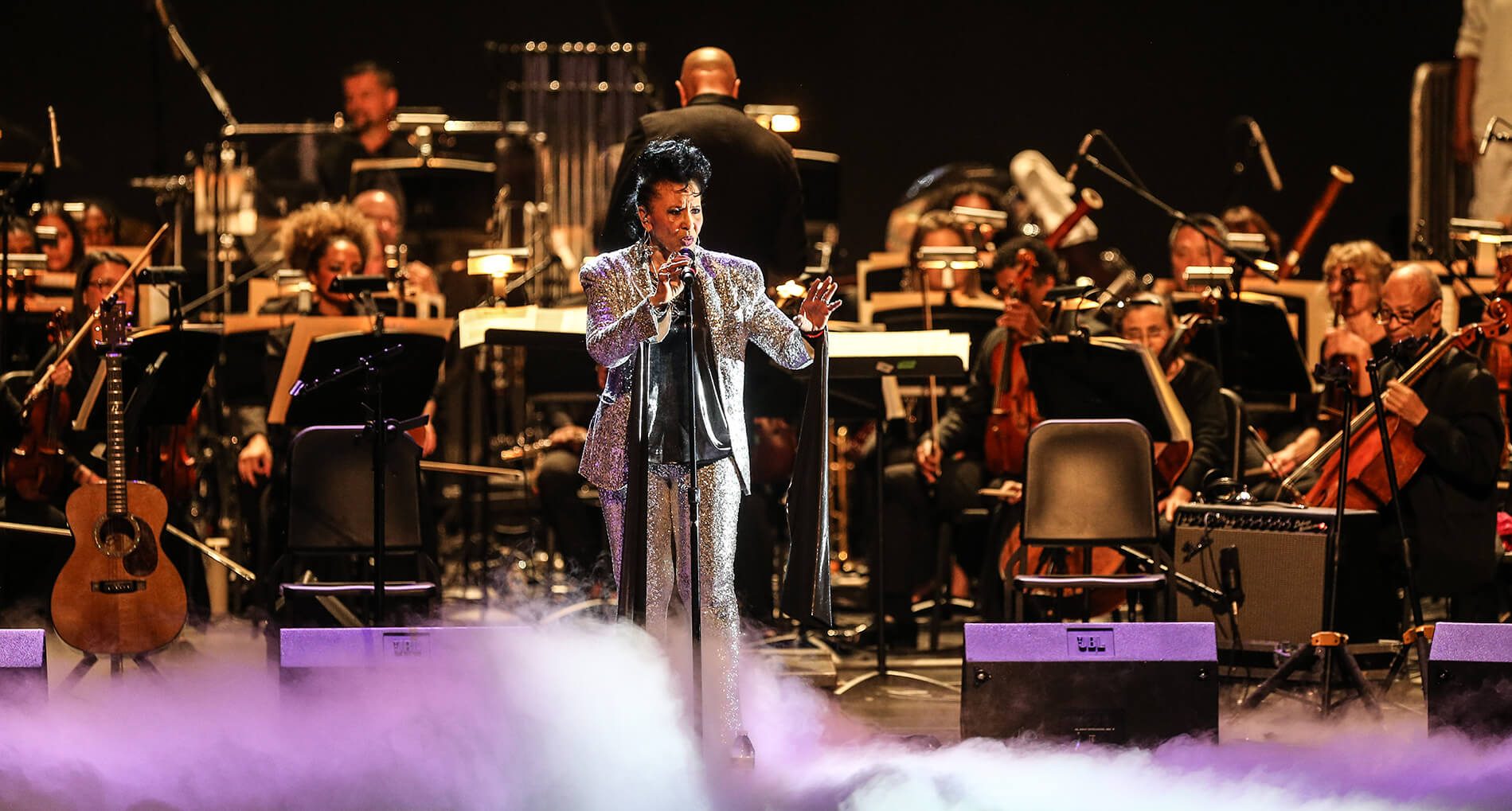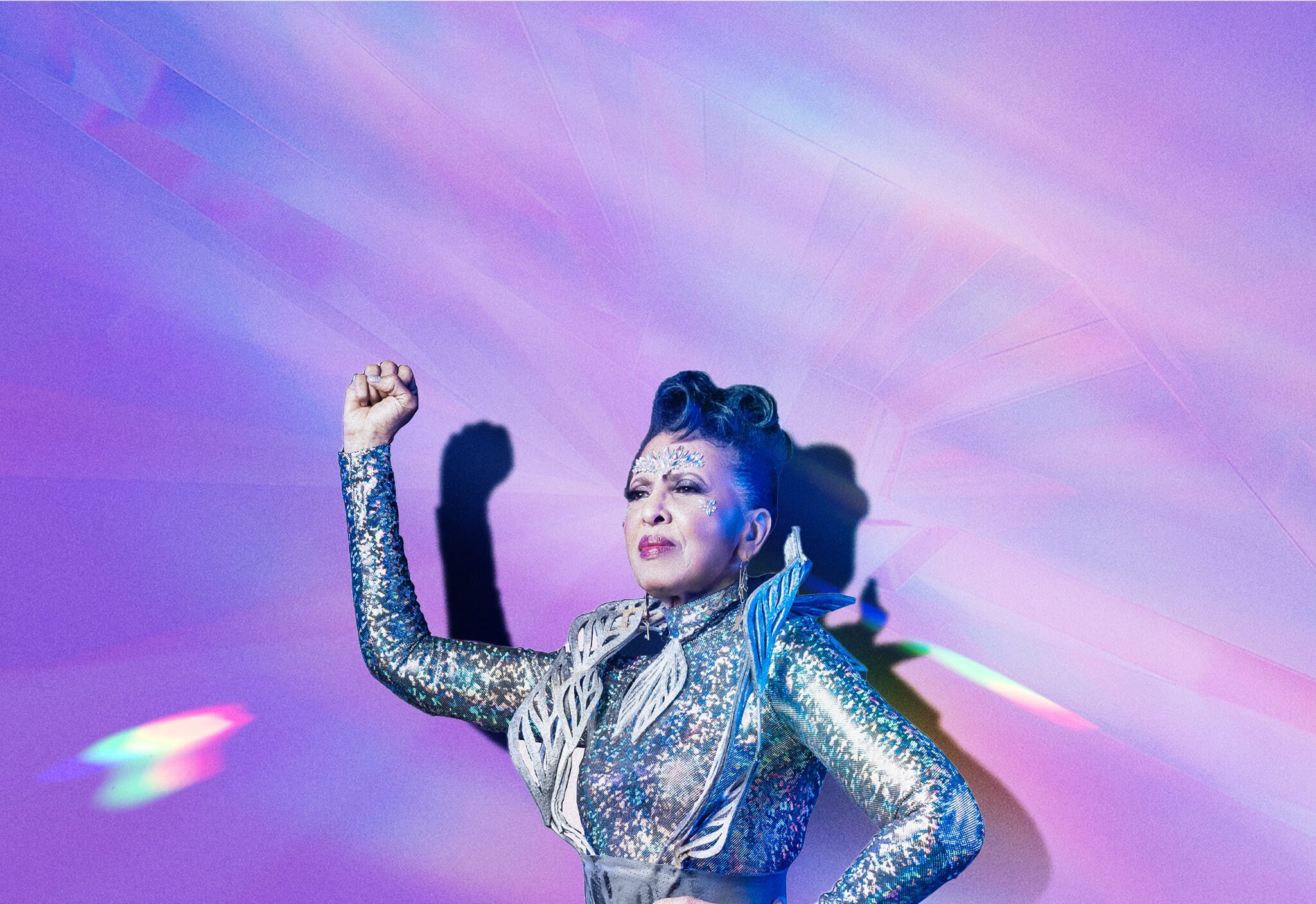I last spoke with Nona Hendryx in late 2017 for an article published in Curve’s Spring 2018 issue. At the time, Hendryx had just been honored as the inaugural recipient of the Vanguard Award by the prestigious New York City venue Joe’s Pub. That award “celebrates the career of a singular artist who has contributed to American life and pop culture [and] sustains and leads their own artistic community while creating a body of work that stands apart from their peers.”
In the six and a half years since then, Hendryx has stayed busy as a musician, artist, and activist. In addition to performing her own music, she has helped to stage other events, from Rock Solid Women (a celebration of Black women who perform rock and roll) to The Gathering, an ongoing collective series that features 80 members of the American Composers Orchestra. This year’s Gathering featured Toshi Reagon in an event billed to “awaken joy as a source of liberation and to find love as our form of possibility and resistance.”
Born in New Jersey in 1944, Nona Hendryx started out as one-quarter of Patti Labelle and the Bluebelles. The initial lineup featured Labelle, Hendryx, Sarah Dash, and Cindy Birdsong (who left to join The Supremes). The remaining trio of Labelle, Hendryx, and Dash underwent an evolution in sound and style that paralleled the changing times. They broke away from the 1960s girl group norm and “reinvented themselves into a thrilling Other,” according to the book Why Labelle Matters. In their new incarnation—Labelle—the tame lyrics and matching dresses were out, replaced by a mix of glam rock, R&B and outfits that featured everything from wild feathers to space suits. As Hendryx once told me with no irony, “I thought nothing of walking down the street in a Martian-type outfit during the daytime.”
Labelle released half a dozen albums, earning them considerable commercial and critical success. They became the first contemporary music act and Black female vocal group to perform at The Metropolitan Opera. Of course, their biggest hit was the 1974 chart-topper “Lady Marmalade,” which Pink, Christina Aguilera, Lil’ Kim, and Mya covered in a Grammy-winning pop collaboration. Labelle’s version still gets significant airplay today, often in queer clubs.
After Labelle broke up in late 1976, the group’s three members embarked on solo careers. Between Patti Labelle’s tenure as the group’s frontwoman, her soaring voice, and her mainstream inclinations, it was no great shock that she became a star. Sarah Dash (who passed away in 2021) released several solo albums, scoring dance hits with “Sinner Man” and “Ooh La La, Too Soon.”
But the most interesting career has belonged to Hendryx. She was the space-age spirit of Labelle, writing many of their later songs and strongly influencing their fashion sense. She took risks and scored successes on her own terms. She released her self-titled solo debut in 1977. A mix of hard rock and R&B, it received critical acclaim but vanished virtually without a trace from stores and got no airplay. Apparently, radio had no idea how to promote a Black woman who made what was, by industry standards, “non-black” music. A highlight of Nona Hendryx was “Winning,” a song that became a hit for Santana a few years later. The album also included the feel-good rocker “Everybody Wants To Be Somebody” and the lovely ballad “Tout de Suite Mam’selle.”
Hendryx’s second solo disc, Nona, was more dance-oriented, providing her with a club smash in “B-Boys” and an R&B hit in “Keep it Confidential.” Her solo output over the last few decades has been sporadic but fascinating. She has collaborated with Prince, Yoko Ono, Keith Richards, Laurie Anderson, Boy George, Nancy Wilson of Heart, Lenny Kravitz, and Mavis Staples—to name a few. In 2008, Hendryx reunited with Patti and Sarah for Back to Now, the first Labelle studio album in over 30 years, and this summer, she was the visionary behind The Dream Machine at Lincoln Center, an Afrofuturist virtual reality experience fusing music, art, and technology.
Openly bisexual (she came out in conversation with The Advocate in 2001), Hendryx is ultimately—as she once told me—an explorer. As she approaches her 80th birthday on October 9, she shows no signs of slowing down. I caught up with her for Curve via Zoom.
The last time [we spoke] was at the end of 2017. You had just been announced as the first Vanguard recipient for Joe’s Pub.
NONA HENDRYX: Oh yes! [That was] great.
Can you tell me more about The Gathering?
NONA HENDRYX: It’s a ring shout. It’s a way of bringing people together—like a call and response. To say, “I’m here, and you’re here,” and respond to each other. [There’s] a healing part of it. When people have that opportunity to come together in a musical context, it brings uplifting, joyful music but also a healing process as well.
At the Apollo, that particular one, The Gathering [was] really large! I think it was more than 60 instruments in the orchestra and 60 voices in the choir. The fact that we were actually able to get that into the Apollo Theater—along with all the other artists, from Toshi Reagon and her band—was amazing. And it had great relevance with the reopening of the Apollo. It was very powerful…There was also Mahogany Browne’s spoken word and her poetry, as a connecting tissue between the different parts of the African diaspora and the African-American community. [That] was really powerful as well.
I was at the Apollo recently for the first time in years. A lot of things stopped during the pandemic, and they’re still slowly coming back.
NONA HENDRYX: Yes. Having had to shut down and distance from each other, it was good to have these elements come together and reconnect.
Are there any musicians in The Gathering lineup you were especially excited to share a bill with?
NONA HENDRYX: All of them! Toshi Reagon specifically. I met Toshi when she was 19. I’d known Sweet Honey in the Rock, of course, and [Toshi’s mother] Bernice [Johnson]. [So] her daughter seeking me out as a mentor—I’ve sort of been in Toshi’s life, performing with her, working with her, writing with her [and] her extended group of artists. It’s wonderful. It is, in a sense, a part of my legacy.
Since I last spoke with you, we have lost Sarah Dash. I was curious about your memories of her and what she brought to Labelle.
NONA HENDRYX: That’s really quite poignant because just last night, I was at Patti’s 80th birthday party! [It] was really celebratory, but there were also lots of images of us being projected as a group together. And there was Sarah.
You know, if you look at [Labelle] as a weight, there’s the centerpiece [and] the two on the other side are constantly trying to find their balance. That’s how I would describe Sarah. And sometimes it was a stress on her because [of] my pulling us one way [and] Patti pulling us another way.
And Sarah’s voice was unique. You know, Patti and my voices are somewhat similar in the lower ranges. Sarah’s voice [was more] in the higher ranges. So there was a middle ground that Sarah was always there for in terms of who we were as individuals and as voices.
I’m curious to get your thoughts on “Lady Marmalade” 50 years after the fact.
NONA HENDRYX: Well, it’s a great song. At the time, it had a certain amount of controversy to it, but it’s one of those songs, as always in life—not always, but pretty often—things occur that you weren’t looking for. “Lady Marmalade” was one of those things. I am grateful to have been a part of it and that it is a song [that] still seems to make people happy.
It’s 55 years since Stonewall, and the fight for LGBTQ rights is ongoing. Any observations about where we’ve come [and] where we still need to go?
NONA HENDRYX: Of course, we continue to evolve and to learn. It doesn’t so much look like it a lot of the time. There are things in general, like any community, that change over time because the people change. It’s a different generation, and there are different needs to be met. The fact that people can be LGBTQ—any of the ways that people want to describe themselves. And trans people—yes, there’s [still] danger. [There are] people who would take your life because you choose to express your love and affection in the way that feels right for you. But I think what we’re doing is building parameters so that there is a certain amount of safety. There is a certain amount of recourse if you are harmed. And people will come together and stand up and support each other. There is community. People can be who they are much more now.
Like the couple that was denied by this baker to make a [wedding] cake. That is stupidity, right? There’s a level of stupidity that [still] exists in the world. So those things get in the way of progress. They don’t really mean anything; it’s somebody just being mean-spirited.
I was fortunate enough to grow up in a liberal family. My social circle is extremely diverse. [But] I’ve learned in the last seven years that my social circle is not America. You know, I knew there were stupid people in this country. I didn’t know that they make up almost half the population.
NONA HENDRYX: I think they’re smaller than they appear to be; they’re just louder. I think also there has been this sort of call to be loud, to be a voice, to be seen—as if they had not been seen [before]. That’s why it appears to be so frenetic and so insane. People are misguided; I should use that term rather than stupid. They’re misguided. I think I’ve recognized that we have a larger uneducated population than we thought we had.
Who are some women who came before you, or those you knew, who inspired you?
NONA HENDRYX: Someone like Josephine Baker would have been an inspiration. Because she created her own genre, really. I was a great admirer of Mahalia Jackson. And renegades, like Amelia Earhart. Women who really embodied…not so much rebellious but individual spirit. Dorothy Dandridge, the actress. We didn’t really know that much about her life—but she was there. Lena Horne. Martha Graham. Those are some of the strongest influences that I could name.
What is at stake for women—and especially women of color and queer women—with the frankly terrifying prospect of a second Trump presidency?
NONA HENDRYX: He falls in that group of stupid people, you know? But I’ve seen stupid people come and go. And stupid people in very powerful positions come and go. They do damage while they’re here—but they’re gonna go. That’s inevitable. He will not live forever. And those who hold him up, who support him—that form of ignorance has been a part of this country since its inception. I have to look at things, as John Lewis would say, with a long arc. And I look at things historically. People who were horrific—they no longer exist, right? So Donald Trump will go at some point. Hopefully, he will be more diminished in November.
And I think as a woman—I identify myself as a woman only as a term, I don’t really hold so much to that kind of identity, I’m a human being, that’s my strongest identification. But if I stand with the people who also [identify] as a woman—as an African-American woman, as a queer woman, as a bi woman, any of that—we will fight back. We couldn’t vote; now we can vote! We weren’t supposed to have jobs; now we have jobs! You know, the stupidity of people trying to hold us back? It’s like trying to push back an ocean. Eventually, the ocean’s gonna win.

NONA HENDRYX PERFORMS AT THE GATHERING
